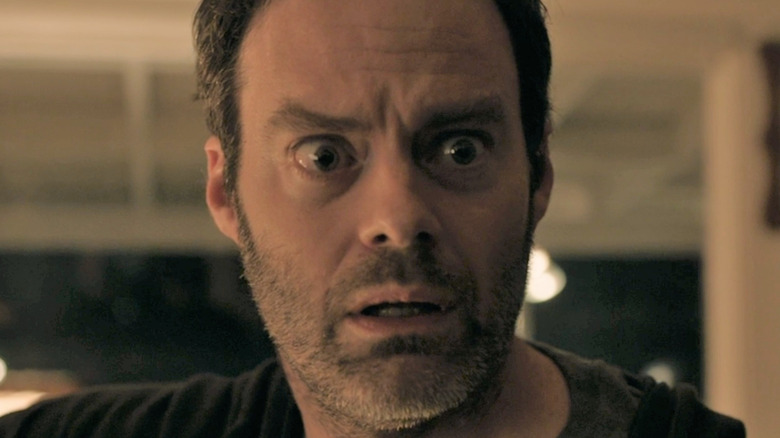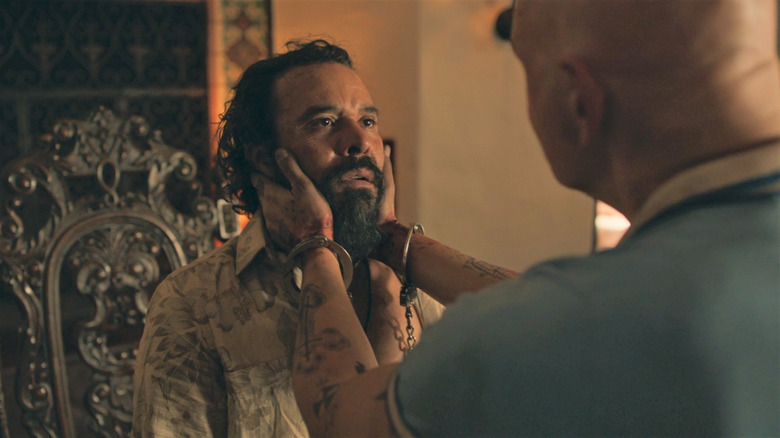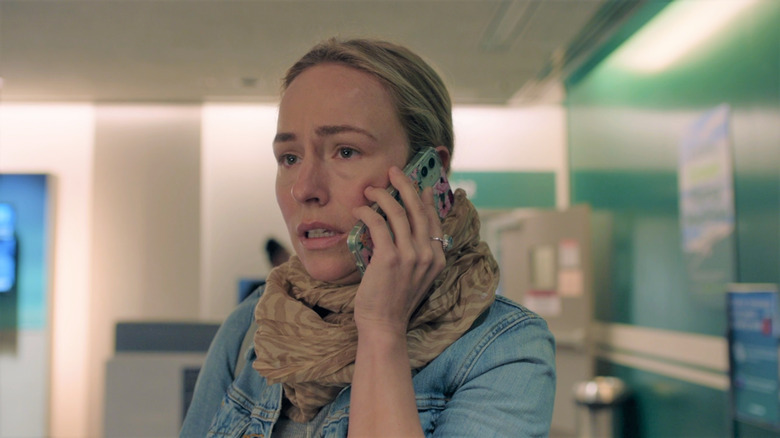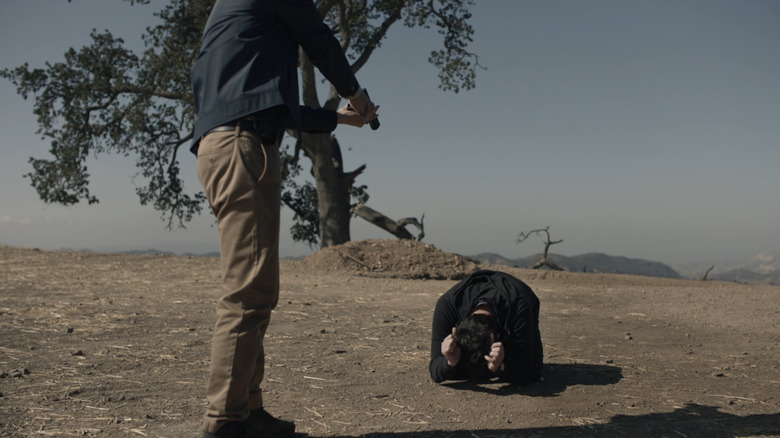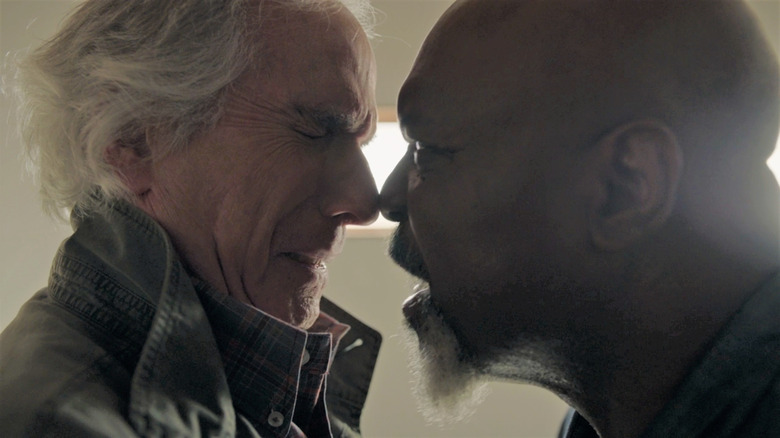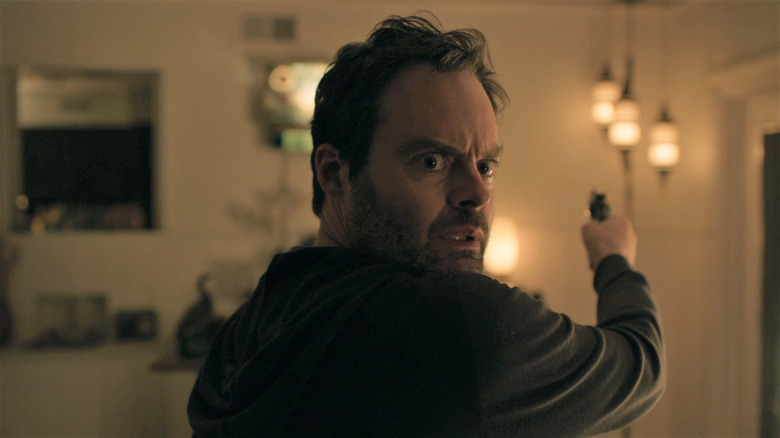The Ending Of Barry Season 3 Explained
This article contains spoilers for "Barry" Season 3 Episode 8, "starting over"
This article contains mentions of domestic abuse and anti-LGBTQ+ hate crimes
After a long delay due to COVID-19, HBO's critically acclaimed "Barry" finally returned with its explosive third season last month. Now, with its eighth episode, television's most affable serial killer has reached the point of no return.
Directed by and starring Bill Hader as the titular Barry Berkman, the final episode of Season 3 is titled "starting now," echoing the promise Barry made several times in Season 1 to leave behind his life of crime. It's what he promised when he left his handler, Fuches (Stephen Root), in the series premiere. It's also what he said after killing Detective Janice Moss (Paula Newsome). But since then, the bodies have continued to pile up.
This final episode delivers stunning conclusions to the plotlines Hader and his co-creator Alec Berg have weaved through the season, culminating in a twist that feels as final as it does inevitable. Along the way, Sally Reed (Sarah Goldberg) reaches the bottom of her dark spiral, NoHo Hank (Anthony Carrigan) reunites with his true love, and Gene Cousineau (Henry Winkler) finally gets his revenge.
NoHo Hank reunites with Cristobal
When Season 3 began, NoHo Hank and Cristobal (Michael Irby) were living in domestic bliss. Both seemed happy, but since Cristobal failed to inform his new lover that he was already married to the cartel heiress, Elena (Krizia Bajos), that love was built on a lie. After Elena found out about their relationship and took Cristobal back to Bolivia, Hank traveled there to find him but was soon kidnapped.
In "starting now," Hank finds himself chained to a radiator in a dungeon. After escaping (which involves a wild animal nearly mauling him), Hank goes upstairs to find what may be the most difficult scene to watch in the entire show. Elena has Cristobal hooked up to an electric battery, electrocuting him while an attractive man dances in a Speedo before turning off the juice and trying to entice him with her body. It's a crude form of what's known as "conversion therapy," a form of torture inflicted on many in the LGBTQ+ community with the disproven belief that their brains can be "re-wired" to remove same-sex attraction.
Hank doesn't hesitate to put a bullet through both Elena and the man assisting her. He embraces Cristobal, who is too delirious from being tortured to respond, but we see something soften in his face. His eyes close. And then we see the abject terror on Hank's face as Cristobal sinks into his arms.
It's unclear whether Cristobal is dead, but that seems to be the implication. Their courtship was one of the bright spots of the season, so we can only hope to see him survive, if only because Hank deserves to be happy, dammit.
Sally skips town in the wake of her brush with horror
Near the start of the episode, the surviving member of the motocross posse from Episode 6's chase scene (Anthony Molinari) invades Barry's apartment, only to find him in conversation with Sally. After sucker-punching Barry, the biker attacks Sally, dragging her to the floor and choking her. For Sally, whose history as a survivor of domestic abuse — specifically being choked — haunted her throughout the show, it's her worst nightmare. But just as it appears she's dead, eyes open on the floor, she uses the last of her energy to stab her attacker through the neck. Then she follows him into the sound booth Barry's roommates built and beats him to death with a baseball bat.
Later, after disposing of the body, Barry calls Sally to plan the future, telling her to "pick a place" they can flee to. But a cut to Sally reveals she's already at the airport, boarding a plane to her hometown of Joplin, Missouri.
This season has been Sally's darkest arc yet. In Episode 1, she's at the height of her career, plucked from the obscurity of Gene Cousineau's acting class to helm her own show. But the show is quickly canceled, and when she finds out her former assistant, Natalie (D'Arcy Carden), now runs a show similar to her own, she melts down, letting loose an expletive-laced tirade against Natalie that lands her on a TMZ-like gossip site. When she comes to Barry, she's there to ask him to terrorize Natalie.
In a show so defined by violence, it's easy to forget Sally has never been exposed to Barry's world. Being forced to take a life for the first time, it seems she's finally returning to that bright-eyed girl from Joplin she used to be.
If you or someone you know is dealing with domestic abuse, you can call the National Domestic Violence Hotline at 1−800−799−7233. You can also find more information, resources, and support at their website.
Albert spares Barry, breaking the cycle of violence
So much of "Barry" deals with the idea that violence begets violence. This season has revolved around the friends and family of Barry's victims coming after him for revenge, destroying themselves in a blind search for retribution. So when FBI Agent Albert Nguyen (James Hiroyuki Liao), Barry's former brother-in-arms from the Marines who Barry saved from a gunshot wound to the head in Iraq, finally corners him in the barren desert outside L.A. to demand justice for Chris (Chris Marquette), we assume it's time for another shootout. This is the same spot where Barry heartlessly dispatched two men back in Episode 1. The ground here is already soaked with innocent blood spilled at his hand.
Instead, Albert spares Barry's life. Maybe it's how pathetic Barry looks, dirty, cowering and sobbing into the arid dirt, waiting for the bullet to come. This isn't the ruthless assassin Albert expected. It's a broken man who knows he's got nowhere left to run and no one he can kill to escape his fate.
Both actors are incredible here. We can see the moment when Albert recognizes that killing Barry will only bring him down to his level. He lowers his gun and tells Barry that if not for him, his 8-year-old daughter wouldn't exist. Holding back tears, Albert says, "I know evil, Barry, and you're not evil, but this has to stop. All of it's got to stop, you hear me? Starting now."
Barry seems to take this as a sign and decides to leave L.A. with Sally to start anew. But this heart-wrenching series finale has one final blow in store for him because he just can't outrun his past.
Gene Cousineau and Jim Moss get their revenge
"starting now" is, in many ways, the mirror image of the season premiere, "forgiving jeff." In that episode, Gene Cousineau reveals that he's figured out Barry killed his girlfriend, Detective Janice Moss, so Barry takes him to the desert to execute him. Ultimately, he decides to revitalize Gene's flagging career as an actor in a twisted form of penance. In the finale, however, it's Gene who has the upper hand, though Barry fails to recognize it.
Early in the episode, Janice's father, Jim (Robert Wisdom), interrupts Gene at brunch with his agent and director. At Jim's house, he interrogates Gene and asks why he's protecting Barry. We don't get to see the end of that interrogation. At the end of the episode, Barry gets a call from Jim, who says he needs to see him. Barry hangs up and calls Gene, who seems to be panicking. "He wants to take us down, Barry," Gene says.
When Barry arrives outside Jim's house, Gene is sitting with a gun. Barry asks if Gene is planning to shoot Jim, and Gene responds, "Barry, he's going to ruin me. He's going to destroy everything I worked for." Gene proceeds to tell Barry that Jim knows Barry killed Janice and is too obsessed with revenge to be reasoned with. So, armed with Gene's gun, Barry heads inside, unwittingly falling for the greatest performance Gene Cousineau has ever given.
In an interview with Vulture, Henry Winkler said, "Gene had to play Barry like a flute in order to stay alive and get to that moment. If he gave anything away or made a mistake, Barry would've sensed it. It wouldn't have worked, and he wouldn't have gotten his just deserts."
There will be justice... starting now
When Barry enters Jim Moss' house, it's quiet but for the sound of a football game on the television (we heard this television and game during the title sequence at the front of the episode). With his weapon drawn, he moves room by room until he sees Jim making a drink at his living room wet bar. Barry closes in, the gun aimed at Jim's head. Just one more killing before that fresh start he's dreaming of.
But before he can fire the weapon, a voice offscreen yells, asking Barry to drop the gun. Jim turns around calmly. He's known Barry would come for him, and he's laid a trap. Outside, the figures of about a dozen SWAT officers move in to arrest him with rifles drawn. Gene Cousineau steps out of the shadows with a knowing look on his face.
As Bill Hader explained to Vulture, "I told Henry, 'You just have to look at him like, 'I got you.” That's the feeling. 'Honestly, you don't have to do much. Just stare at me.' And he did it."
The episode ends with a long shot of Jim, framed through the bay windows of his darkened living room. On the end table next to the couch sits a black-and-white photo of Janice. Her memory lives on in that empty house, and now that justice has been served, Jim still must go back inside to face that emptiness, the absence of his daughter cloying at the edges of his life. Justice won't bring her back to him.
And that's it for Season 3 of "Barry"! It's been a wild ride, and though it seems our favorite serial killer is done for, fans know that just about anything can happen on a show like "Barry" that's always been willing to stretch the limits of television. We'll be waiting at the edge of our seats for Season 4, which we know is already partially written.
